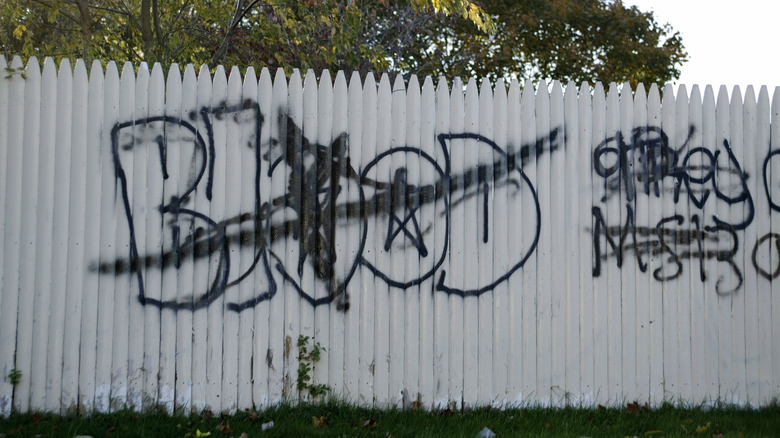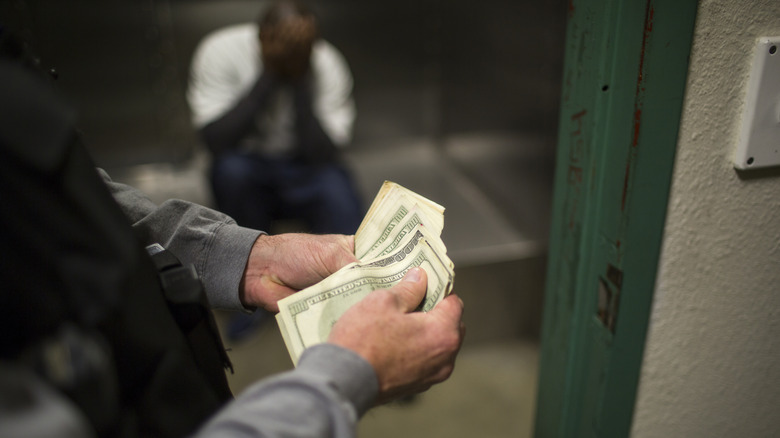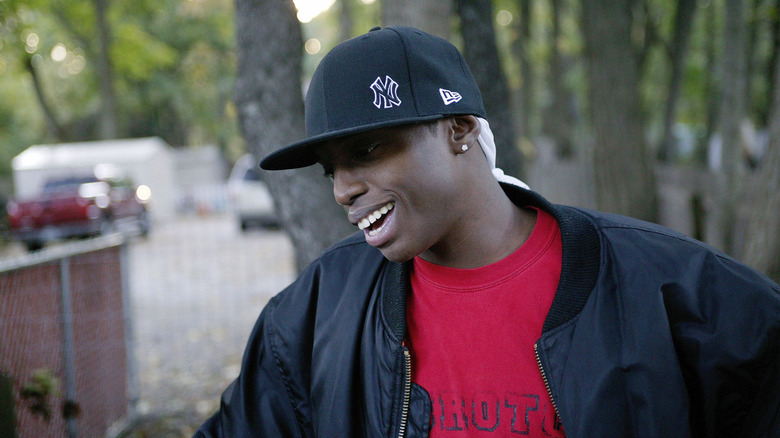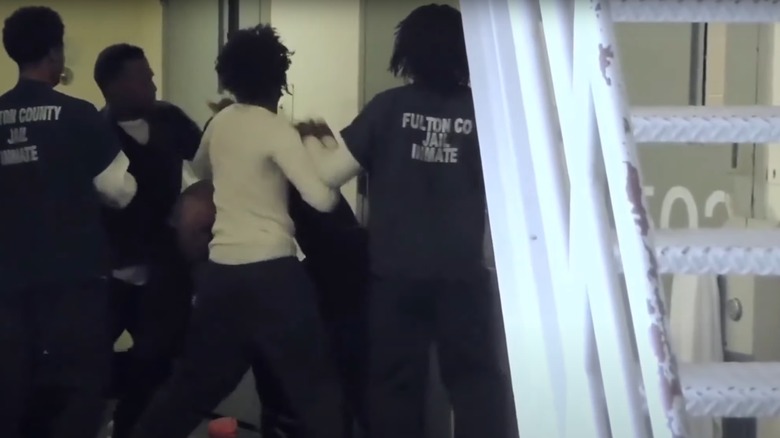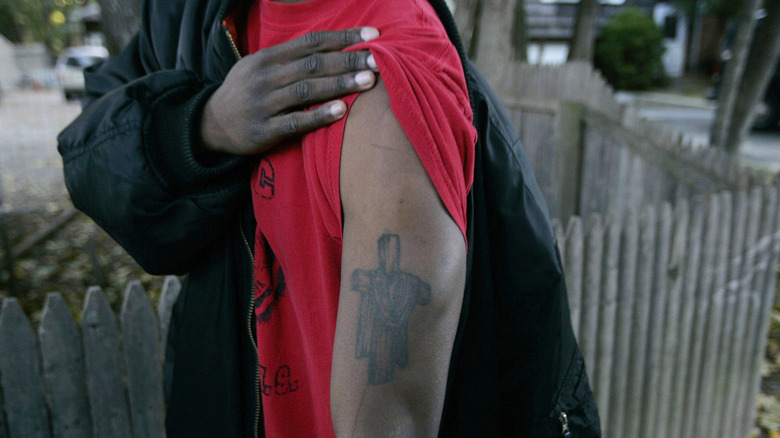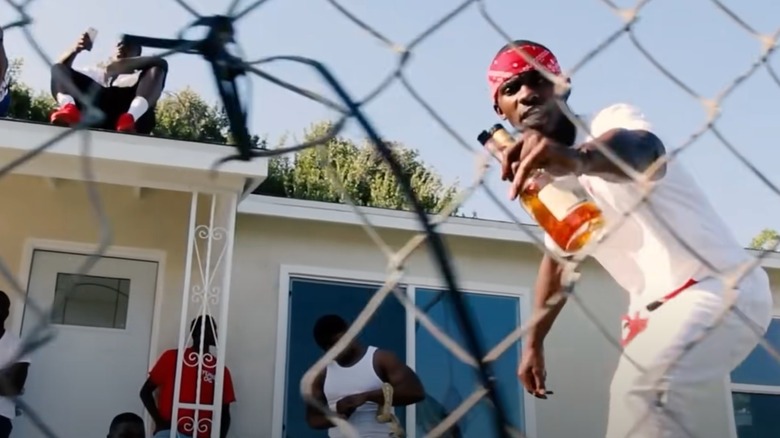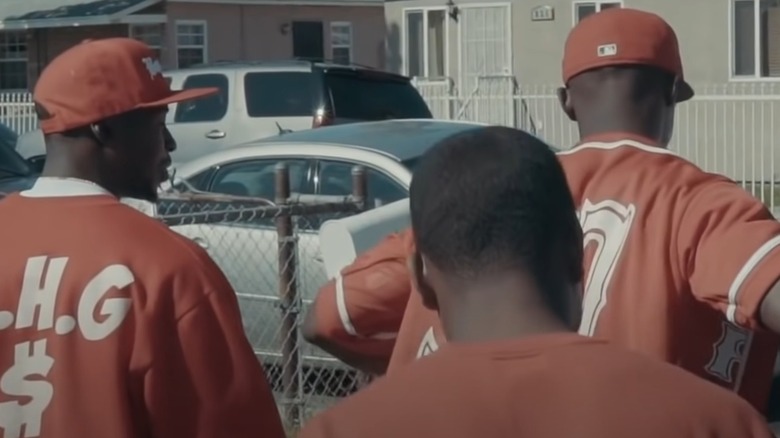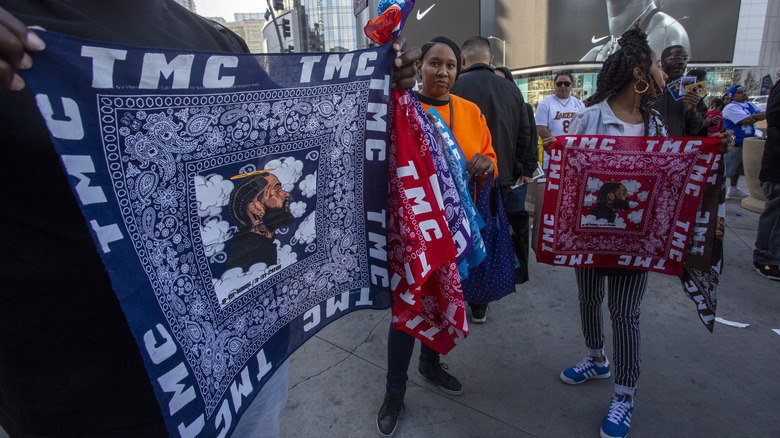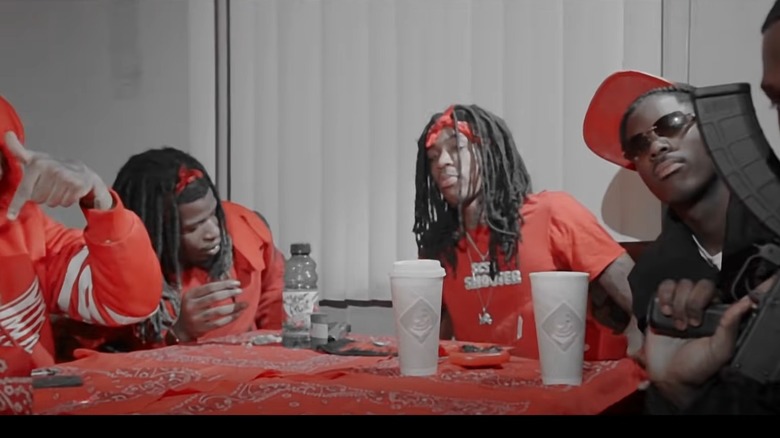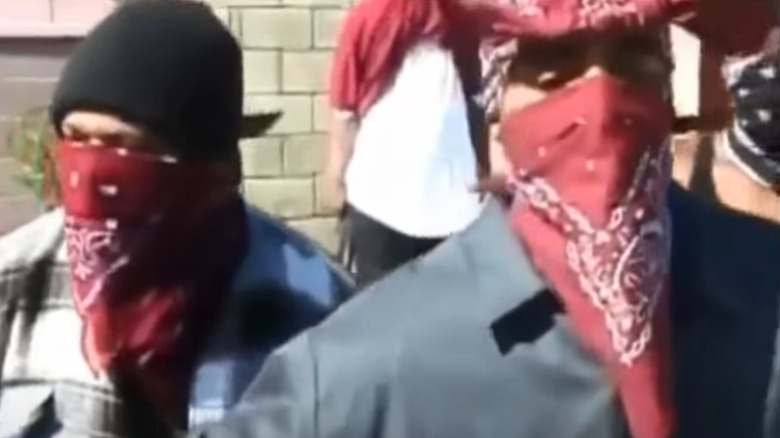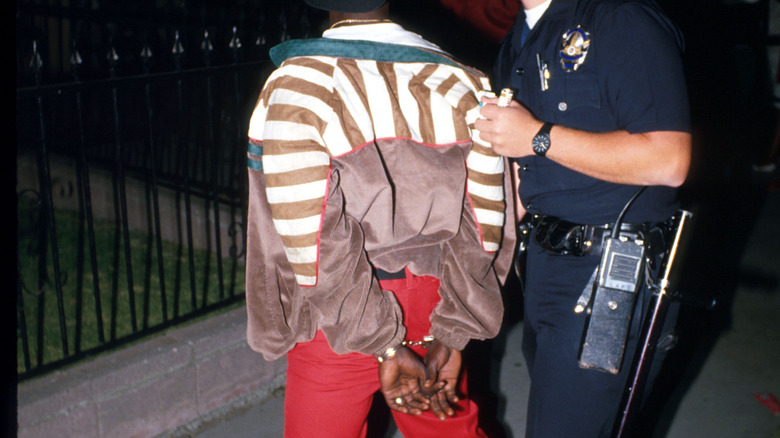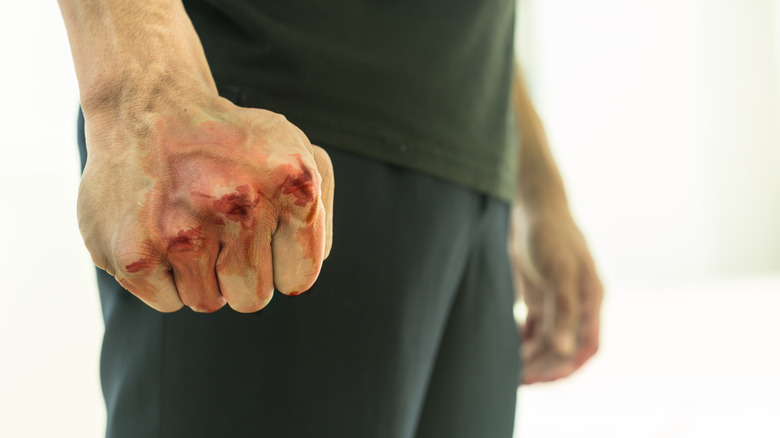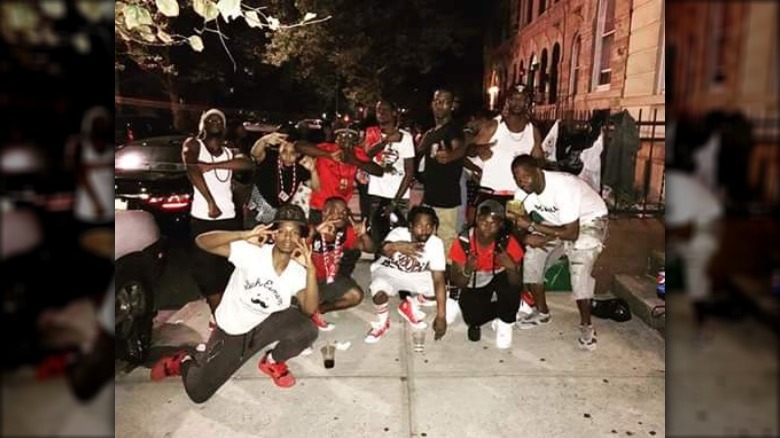Rules Bloods Have To Follow
In 1972, on the streets of Los Angeles, a gang war between the dominant Crips and several local rivals was playing out, per Black Past. When these smaller gangs formed an alliance to oppose the Crips, the gang known as the Bloods was born. Their ferocity would help them overcome their numerical disadvantage and propel them into notoriety as one of the largest and most feared gangs in the United States, and the archetypal opponent of the Crips.
Contrary to what you might think, the Bloods are not a monolithically ruled gang. Instead, Blood gangs are a vast patchwork of local "sets," each distinct from others, as described in an intelligence report released by Virginia State Police. Over decades the Bloods have set out a series of rules and codes of conduct that their members must follow. A looser, more locally enforced doctrine exists for the West Coast Bloods, based in their founding city of Los Angeles. Over on the East Coast, the United Blood Nation (UBN) governs by the 31 rules of the UBN. New members of the UBN are given a copy of these rules, which they are expected to memorize. Being originally primarily a jailhouse gang, the UBN needed a greater level of organization and a well-defined creed to compete with other well-established organized crime gangs on the East Coast. Although the specifics vary between Blood "sets," many of these rules are common to all Bloods, who must obey or face their homies' wrath.
Membership costs money
Any organization needs a steady source of revenue to help fund their activities, and Bloods are no different. Like an HOA or your favorite streaming service, Bloods membership comes with monthly dues. According to the U.S. Department of Justice, these dues may be either $31 or $93 (3 x $31) — the numbers 1 and 3 are of significance, as they are symbolic in the Bloods' canon (via a report from the Virginia State Police).
Once in the local gang's treasury, according to a report by WSOC-TV, some of these funds are used locally, such as for loans to gang members. A significant remainder is then passed up to gang leadership, where it may be used to fund gang activities like purchasing firearms, buying cell phones for inmates, and getting gifts for incarcerated gang leaders.
Failing to pay your membership dues will incur a violation which, unlike the aforementioned HOA example, will mean a beating or worse. Expulsion from the gang is also possible. As reported by lohud, the Yonkers, New York-based Blood Stone Assassins made this threat to members in a private Facebook chat, where they explained that failure to pay dues would result in members being "out the whip" and "parked," code for being thrown out of the gang.
The chain of command is well defined and paramilitary in nature
An inviolable chain of command exists in the Bloods, per UBN rule No. 4 (via gang expert nonprofit Throggs Neck-La Famiglia [TNLF]): "In our organization we will respect every commanding officer." And No. 19: "We will always show a state of obedience so others outside of our cipher can judge us by what we are and what our organization can accomplish." The North Carolina-based Black Mob Gangstas were well-structured enough for the U.S. Attorney's Office in the Eastern District of North Carolina to describe them as an "enterprise."
As detailed in a report by the State of Virginia, depending on the length of membership and work put in, members progress through a set of ranks, whose names vary from set to set and by affiliation to West or East Coast Blood gangs. One example from this report describes how the Southside Brim have seven listed ranks starting with "Baby Gangster" and ending with the highest rank of "Triple OG (Original Gangster)."
Orders are taken with military-like obedience, too, scaling from simple, local tasks such as collecting membership dues to state-wide war. As reported by the U.S. Department of Justice, in 2011, Pedro Gutierrez, a "Godfather" of the NYC Bloods gang Nine Trey Gangsters, ordered a gang war in North Carolina. His orders to inmates belonging to the Bloods gang were to attack members of a "renegade gang called Pretty Tony," causing several extended prison lockdowns and multiple injuries.
Bloods must never argue in front of outsiders
Bloods are expressly forbidden to quarrel in public, where non-Bloods could be witnesses, as specified in UBN rule No. 5 (via TNLF): "In our organization we will never argue in front of outsiders." Anyone forgetting this rule and getting into it with a fellow Blood risks then getting jumped by other Bloods in attendance, one instance of which was shown in an episode of "60 Days In."
The footage is taken from inside a prison during a dispute between two Blood members, who had an issue due to one of them having stolen from a third inmate. Before fists fly, and in a key example of Blood business being discussed privately, the group convened and sought permission from the set leader before action was taken. Not long afterwards the situation escalated to both gang members getting into a fist fight, followed by the four fellow gang members jumping them both in a flurry of arms and fists. As discussed later in the clip, this was punishment for the two antagonists fighting in public. Bloods are expected to handle their internal business in private.
Gang members must be 'branded'
As detailed by TNLF, a common Bloods tattoo or brand is three dots or circles arranged in a triangle, called the "Dog's Paw," and members are required to be "branded" with them. According to "Gangland: An Encyclopedia of Gang Life from Cradle to Grave," the three circles represent triple "O"s, which is the code for Blood, as per TNLF.
Don't have access to a tattoo artist or tattoo gun? In that case, a new initiate will typically be branded by a gun barrel or a cigarette. The latter is especially common in prisons where guns (of both the bullet and tattoo variety) are scarce.
While the "Dog's Paw" is common throughout the East Coast, Bloods are expected to show their membership with other tattoos that may vary according to location. Another common tattoo, most notably seen on the neck of the former Patriots star Aaron Hernandez during his 2015 murder trial, is a five-pointed star that has been associated with the Bloods, as reported by WCVB. Gang members might also get weapons, a pit bull, blood drops, or combinations of all these with a theme from the members local "hood," as listed in a Virginia state police intelligence report.
October 31 is a very important date
According to the TNLF, October 1993 is when the founders of the UBN got together in prison to unite against rival Hispanic gangs and thus officially establishing the Bloods there. They crafted the 31 rules for UBN members to follow and, for the gang, those numbers have meaning. The symbolism of zero means blood, one is for unification of all Bloods, and three is for the 31 rules, according to an intelligence report published by Virginia State Police. Because of this, October 31 was designated the gang's official birthday.
Rumors have long circulated about Bloods' gang activities on or around this auspicious date, perhaps amplified by Halloween. In 2008, fears of impending gang attacks on October 31 were elevated after a shooting in Newark, New Jersey, with two killings, as well as a Virginia state police intelligence report that mentioned such fears (though it did not actually validate them), as reported in The Grio. These rumors, often spread through emails, have since been discredited by both Snopes and law enforcement.
So if Bloods aren't rampaging and slashing their way through the streets as the rumors say, what are they actually doing on October 31? The key word in this Blood rule is "respect." Accordingly, it's said Bloods should fast on the 31st to honor this date, according to an New York Police Department gang manual. So rather than committing violence or any sort of Halloween trickery, Bloods members simply chill.
Keeping up appearances is encouraged
After taking the trouble to put a set of clear rules in place, as well as enforce them, the Bloods take some pride in showing outsiders unity and a level of professionalism usually associated with Italian mafia families. Particularly in the East Coast UBN, keeping your cool (unless violence is mandated), looking smart in court, and keeping your head when things get heated are Blood law.
As reported in The Charlotte Observer (via The Winston-Salem Journal), in 2018 James Baxton and Pedro Gutierrez presented themselves in Charlotte federal court to answer to charges of racketeering. Turning out in smart business attire, their appearance drew comparisons to CEOs by the prosecutors, with one stating in opening arguments, "They are the CEOs, the presidents, the supervisors, the managers of the Bloods." Both individuals, high ranking members of the Nine Trey Gangsters, were setting examples of the rules stating that members should "keep an up and alert mind while going to court or any area around us" and "we will always use intelligence over emotion," visually at least.
Even at the local level, rules reported by the NYPD from seized gang literature exhort members to "always keep your dress code/hygiene up to par" and to "never start a conflict unless it's important, because everything you do reflects on each and every Blood ..."
Rivalry with the Crips
The feud between the Bloods and the Crips is legendary, not surprisingly since the Bloods' very foundation was to oppose the Crips in the early 1970s, per Britannica. Their beef with each other has lasted longer than some countries existed, and all Blood members are expected to follow this simple rule — that the Crips are and always will be the enemy.
Hatred of the Crips is so ingrained that a Blood member can not wear the color blue (the primary Crip color), as per an NYPD gang manual, and must avoid using words containing the letter "C" as much as possible, otherwise writing this letter upside down or stricken through to show disrespect, a style often seen in their graffiti, Corrections.com reports. Crips are disparagingly nicknamed "crabs," and any Crip daring to venture into Blood territory is asking for trouble, as a gang member known only as "Red" explained to the Niagara Gazette: "Don't step on our territory and we won't step on yours ... But if you do [step on our territory], we will f*** you up."
Nonetheless, ceasefires have been called by gang leadership. According to The Source, the first truce of the Watts neighborhood in L.A. was in 1992, following the death of a gang member at the hands of the LAPD, which just so happened to be days before the L.A. riots erupted as a response to the acquittal of the cops who beat Rodney King. In 2019, another ceasefire was called after the murder of Nipsey Hussle, reports the Los Angeles Times.
Respect (and feed) your fellow Bloods
Much like a family, while infighting between Blood members can be common — if discouraged and commonly out of public view — Bloods are expected to respect and support each other. Bloods are to "never take another Blood's kindness for weakness," and "never deny another Blood a plate of food or a drink," according to TNLF.
Several of the UBN's rules read much like what one would expect from a jailhouse gang, including provisions, TNLF describes, to ensure new Blood inmates are provided with "clean clothes, food, soap, shampoo, powder, deodorant, money, protection, and phone time." Antwaun Johnson, an inmate writing for Prisonwriters.com who has childhood friends in the Bloods, describes how "there's a Blood shower ... There's a Blood phone ... phones only those gang members can use."
This respect for one another also feeds into one of the main reasons and perceived benefits of joining a gang in the first place, particularly in prison: protection. These gangs will unite with any fellow member that's in trouble, as Johnson further describes, who, despite being over 5 feet 10 inches and 243 pounds, said, "If I have an argument with a gang member and we start the fighting, I will get jumped AUTOMATICALLY, being that I am not gang-affiliated. I'm classified as a civilian. No one will fight me one-on-one. So as soon as I start fighting, two, three of them will engage instantly — even if I was in the right."
Blood in, blood out, membership is for life
Becoming a Blood when in prison, especially for a first-time inmate, can be appealing for the protection and support it seemingly offers to those that qualify. But leaving a gang is far harder than canceling a subscription to a streaming service; once you leave prison, your membership will follow you home.
An anonymous Blood member known only as "Red" told the Niagara-Gazette that leaving the gang or "folding the flag" — in reference to the red flags all Bloods are expected to carry — appears to be easier for leaders to do. Referring to the boss as the "Big Homie," Red reveals how the leaders still remain part of the gang even after they have technically quit: "You still contribute to him," Red says. "I got love for [him]. You love him because without him, there wouldn't be you. You still Blood at the end of the day."
Some gang members instead join the military, so they are trading one hard-to-leave and risk-laden group for another, as reported by the FBI. Sadly though, even though the military certainly plays down any negative impact this may bring, such as reported in Stars and Stripes, not all manage to part ways with the Bloods. Former Army Spc. Latif Johnson was convicted in Charlotte, North Carolina, for racketeering for the United Blood Nation while serving in the military, receiving a reduced sentence due to his military service, as reported by WSOC-TV.
Keep Blood business in the ranks
You'd be hard-pressed to find a gang that openly tolerates snitches, as it tends to be bad for business — and the Bloods are no exception. The UBN makes it clear what the most important rule is: "In our organization we will have no snitches," per TNLF. While over the years it's true that a wealth of knowledge about the Bloods and their inner workings has been either leaked or been straight-up seized, as reported by the NYPD, any Blood member or set is still expected to keep Blood business purely Blood to Blood unless expressly permitted by the highest-ranking members.
A DOJ report from 2020, in listing the various crimes committed by Demetrice Devine, a "Godfather" of the Gangsta Killer Bloods from North Carolina, mentioned how this top-ranking member ordered the shooting of an informant, repeating the order to kill them after they survived and were recovering in the hospital. Devine also put pressure on subpoenaed gang members to keep their silence, as well as taking the trouble to personally beat up a member whose loyalty he doubted. Snitching, particularly to law enforcement, is forbidden and needs a seriously big carrot (say, a large sentence reduction, such as one case reported in the Virginian-Pilot) to happen.
The price of admission includes a timed beating
Helping foster a sense of unity when joining the Bloods includes a brutal initiation of having to withstand a 21- or 31-second (on the West Coast and East Coast, respectively) beating from the very Blood gang you're attempting to join, as detailed in a Virginia state police intelligence report – sometimes called a "jump-in" or "shoot the 31." In his interview with the Niagara Gazette, an anonymous gang member going by "Red" described shooting the 31 as "everyone in your Blood set, you fight every one of them for 31 seconds." And this isn't a "Fight Club" situation where each person waits their turn; no, this is "everyone, all at once."
If you prefer keeping your face intact, getting pummeled for half a minute might not be the only way to be initiated. Red also explained to the Niagara Gazette how a wannabe Blood can join by "putting in some work" instead. "You can go on a robbery or something," Red said. "You make sure you bring something back to your Bloods, like an offering."
Flying the Blood flag
True to their name, the color most associated with Blood members is red, though other colors may be worn depending on the particular set, as an NYPD gang manual describes. However, no matter what local colors they might sport, you will absolutely never see a Blood member dressed in blue, since it is the traditional color of their main rival gang, the Crips, according to Britannica.
All Blood members are given a red flag, which they may wear as a bandanna or hang from their clothing, per a Virginia state police intelligence report. Regardless of how they choose to sport it, it is expected that a Blood keeps their flag visible even if it may put them in harm's way, such as being spotted by a rival gang member. And dropping the flag is considered a great disrespect. "Red," an anonymous Blood member, when talking to the Niagara Gazette, put it in simpler terms: "You never hide your flag, even if that means taking an a** whooping. That's what it is."
